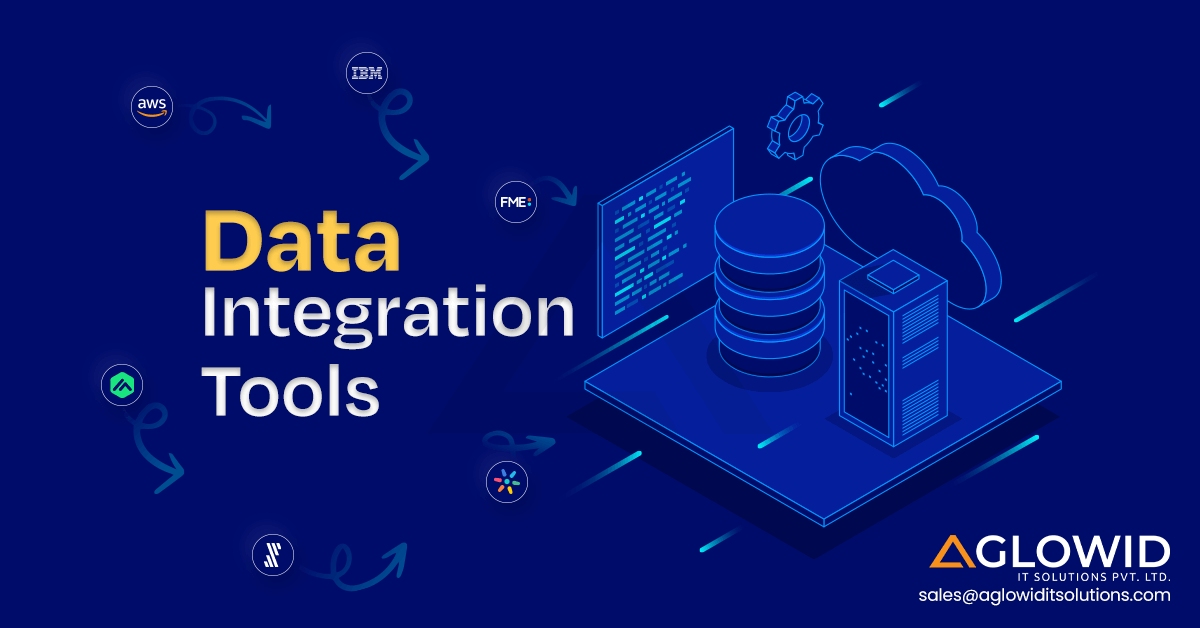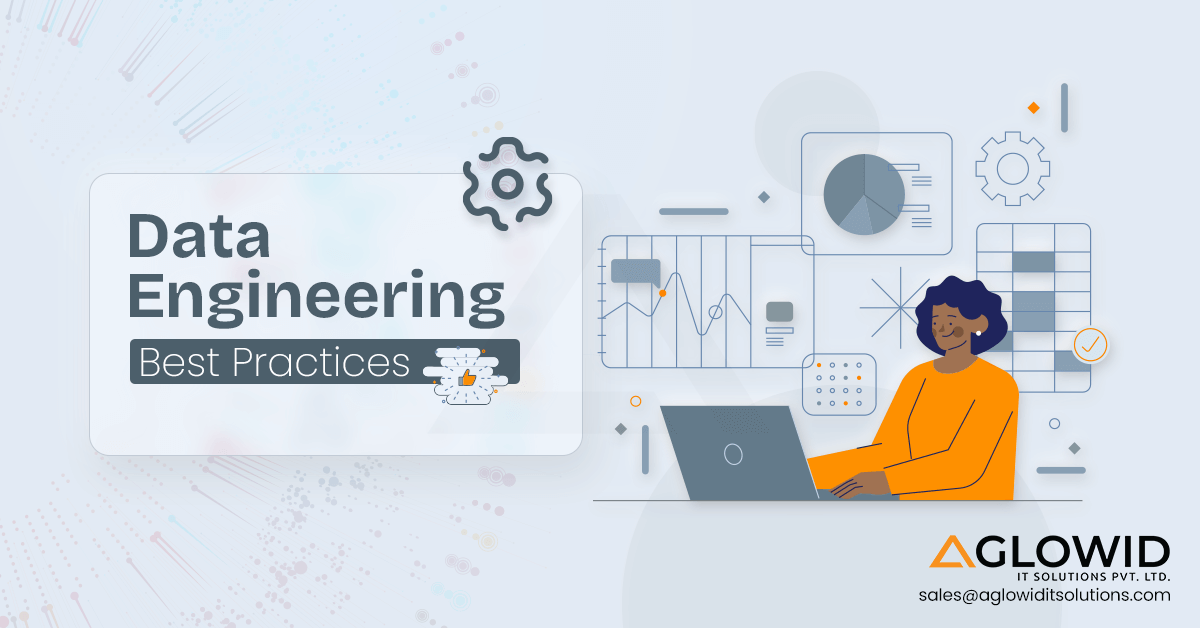Quick Summary:
In today’s data-driven world, finding and hiring a skilled data engineer is crucial for businesses aiming to harness the power of big data. Data engineers play a pivotal role in building and maintaining the infrastructure that drives data analytics, machine learning, and other advanced technologies. However, with the demand for data engineers on the rise, identifying the right talent can be a challenging task.
In this blog, we’re going to discuss📝
- Understanding the Role of a Data Engineer
- Key Skills and Qualifications to Look For
- Ways to Hire a Data Engineer
- Where to Find Qualified Data Engineers?
- The Hiring Process for Data Engineers
- Top Interview Questions for Data Engineers
- Common Mistakes to Avoid When Hiring a Data Engineer
- How Much Does It Cost to Hire a Data Engineer?
Stats and Fact Check….
As per reports, In 2023, the global data engineering market was valued at approximately $23 billion, and it’s expected to grow at a compound annual growth rate (CAGR) of 17.6% from 2024 to 2030.
- Senior Talent Demand: The proportion of data engineers with 6+ years of experience increased significantly across various sectors, rising from 27% in 2023 to 38% in 2024. This suggests a growing demand for senior-level talent in the field
- Salary Growth: In 2023, a significant percentage of data engineers earned between $100,000 and $120,000 per year. In 2024, this proportion increased to around 38%, up from approximately 30% in 2023, indicating a growth of around 8%.
- Job Availability: While precise figures are challenging to pin down, there were 10,593 job openings for data engineers across all industries found on online job portals
- Attrition Rates: The overall attrition rate in companies decreased from 18% in 2023 to around 14% in 2024, indicating improved retention strategies and possibly better job satisfaction or market conditions
- Sector-Specific Employment: In the non-IT sectors, the BFSI sector accounted for 49.3% of data engineer employment in 2024, highlighting a significant concentration of data engineering roles in this industry
Whether you’re a startup laying the foundation for your data architecture or a large enterprise optimizing your data pipelines, hiring the right data engineer is crucial to your success. This guide provides a comprehensive overview of how to find, evaluate, and hire a data engineer who can meet your business needs.
Understanding the Role of a Data Engineer
Data engineering is a critical role in any data-driven organization. Data engineers are responsible for designing, developing, and maintaining the systems that allow organizations to collect, store, and analyze data. They work with large-scale databases, cloud services, and data processing frameworks to ensure that data is readily available for analysis.

Core Responsibilities of Data Engineers
Data Pipeline Development
Data engineers build pipelines that automate the collection and transformation of data. These pipelines ensure that data flows seamlessly from various sources to data warehouses and analytics platforms.
Data Storage and Retrieval
They design and optimize data storage solutions, ensuring that data is stored efficiently and can be retrieved quickly when needed.
Data Quality Management
Ensuring the integrity and quality of data is a key responsibility. Data engineers implement processes to clean and validate data, removing errors and inconsistencies.
Collaboration with Data Scientists and Analysts
Data engineers work closely with data scientists and analysts, providing them with the infrastructure and tools they need to perform complex analyses.
Key Skills and Qualifications to Look For
When hiring a data engineer, it’s important to assess both their technical skills and their ability to work within your business environment. Here are the essential qualifications and skills to look for:
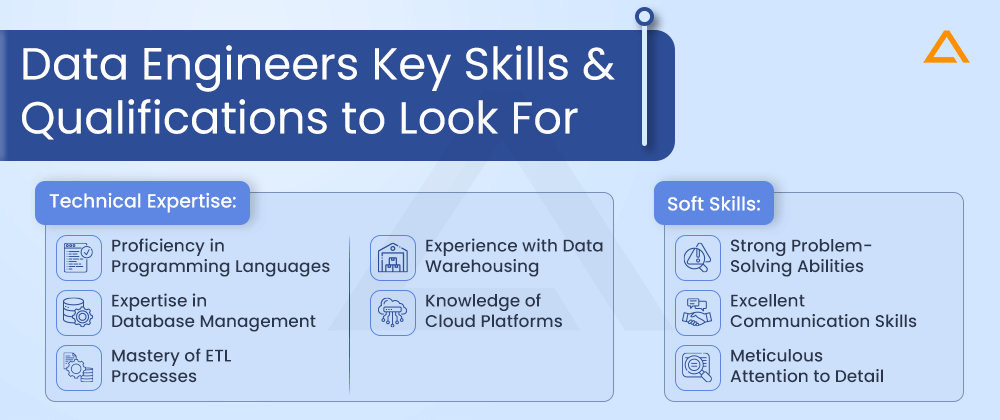
Technical Expertise of Data Engineer
Programming Languages
Proficiency in programming languages such as Python, Java, and Scala is essential. These languages are used to write scripts for data processing and manipulation.
Database Management
A strong understanding of both SQL and NoSQL databases is necessary. Data engineers should be able to design, optimize, and query complex databases.
ETL Processes
Experience with ETL (Extract, Transform, Load) processes is crucial. Data engineers should be skilled in creating and managing ETL workflows that ensure data is accurately transformed and loaded into data warehouses.
Data Warehousing
Knowledge of data warehousing solutions like Amazon Redshift, Google BigQuery, or Snowflake is important. Data engineers should be able to design scalable data warehouses that support large volumes of data.
Cloud Platforms
Familiarity with cloud services such as AWS, Azure, or Google Cloud Platform is highly valuable. Data engineers often work with cloud-based tools and services to build and maintain data infrastructure.
Soft Skills of Data Engineer
Problem-Solving
Data engineers must be adept at solving complex problems, often working under tight deadlines.
Communication
Effective communication skills are necessary for collaborating with data scientists, analysts, and other stakeholders.
Attention to Detail
Precision is critical in data engineering, as even small errors can lead to significant issues in data processing and analysis.
Ways to Hire a Data Engineer
There are several approaches to hire a professional Data Engineering Service Company or skilled data engineer, each with its own advantages and challenges. Depending on your company’s needs, budget, and timeline, one or more of these methods may be the best fit:

In-House Hiring
Hiring a data engineer to join your team full-time is ideal if you have a long-term need for data engineering expertise. This approach allows for close collaboration and deep integration with your existing team.
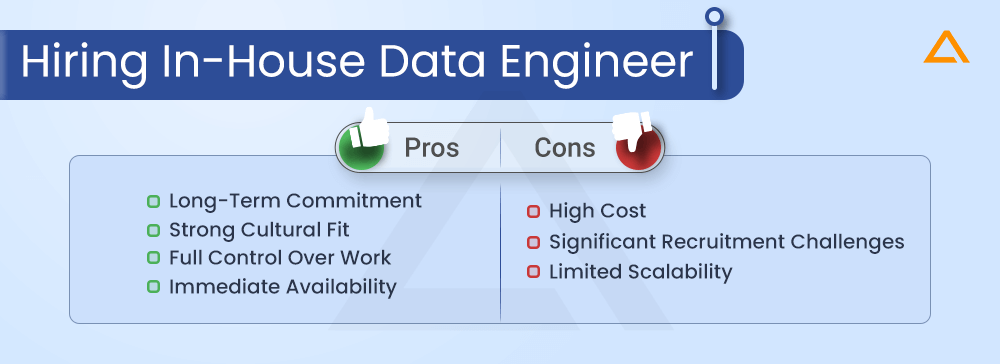
Pros:
- Long-Term Commitment: Employees are more likely to stay with your company.
- Cultural Fit: Easier to ensure alignment with your company’s culture.
- Full Control Over Work: Direct management of projects and processes.
- Immediate Availability: Team members are available during your business hours.
Cons:
- High Cost: Salaries, benefits, and taxes add up.
- Recruitment Challenges: Finding the right candidate is time-consuming and costly.
- Limited Scalability: Difficult to adjust team size quickly based on project needs.
Freelancers
Freelance data engineers are a good option for short-term projects or when you need specific expertise on a temporary basis. Platforms like Upwork and Toptal are popular for finding freelance talent.
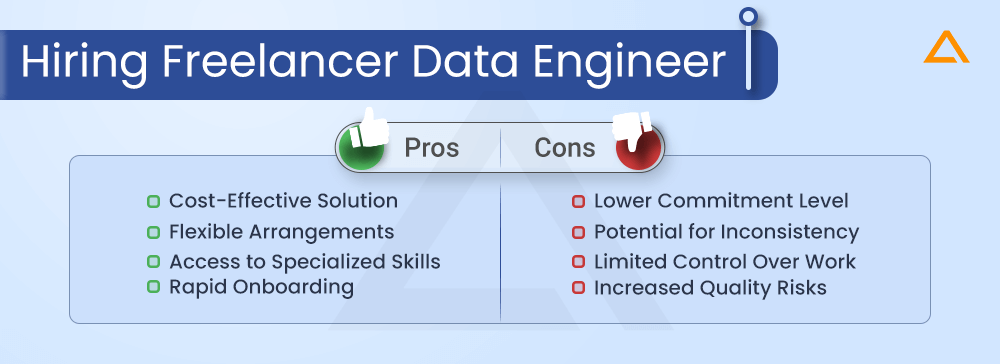
Pros:
- Cost-Effective: Pay only for the work done, no long-term commitments.
- Flexibility: Hire on an as-needed basis.
- Access to Specialized Skills: Freelancers often have diverse experience.
- Quick Onboarding: Freelancers can start working on your project almost immediately.
Cons:
- Less Commitment: Freelancers may prioritize other clients.
- Potential for Inconsistency: Continuity across projects may be lacking.
- Limited Control: Less oversight of work processes.
- Quality Risks: Vetting is crucial to ensure high-quality work.
Outsourcing to an Agency
Outsourcing to a specialized agency allows you to tap into a team of experts without the need for long-term commitments. This model is particularly useful for large-scale projects or when you lack the in-house expertise.
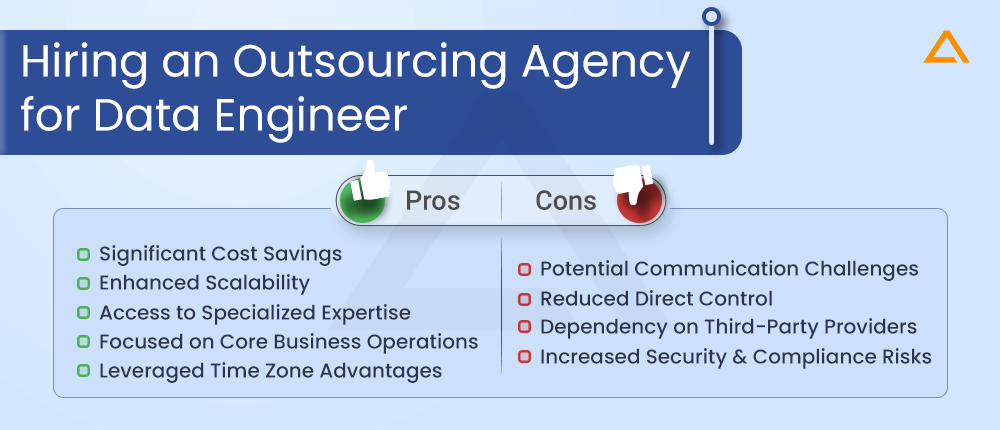
Pros:
- Cost Savings: Access skilled engineers at a lower cost, especially in countries like India.
- Scalability: Quickly scale your team up or down.
- Access to Expertise: Leverage specialized skills from a broad talent pool.
- Focus on Core Business: Internal teams can focus on strategic tasks.
- Time Zone Advantages: Benefit from round-the-clock productivity.
Cons:
- Communication Challenges: Time zones and language barriers may complicate collaboration.
- Less Direct Control: Reduced oversight of daily operations.
- Dependency on Third-Party Providers: Risks if the provider fails to deliver.
- Security and Compliance Risks: Need to ensure strict adherence to data security protocols.
Where to Find Qualified Data Engineers?
There are several approaches to hiring a data engineer, each with its own advantages and challenges. Depending on your company’s needs, budget, and timeline, one or more of these methods may be the best fit.
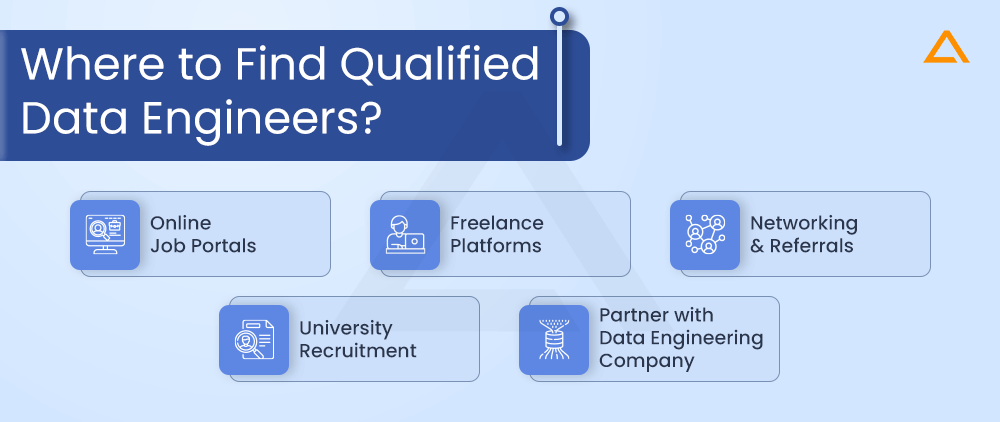
Online Job Portals
- LinkedIn: LinkedIn is a powerful platform for finding data engineers. You can use advanced search filters to target candidates with specific skills and experience.
- Indeed: Posting your job on Indeed can help you reach a large audience of job seekers.
- Glassdoor: In addition to job postings, Glassdoor offers insights into candidate expectations and company reviews.
Freelance Platforms
- Upwork: Upwork is a popular platform for finding freelance data engineers. You can browse profiles, review past work, and hire engineers for short-term projects.
- Toptal: Toptal connects businesses with top-tier freelance data engineers. The platform vets its freelancers, ensuring that you have access to highly skilled professionals.
Networking and Referrals
- Industry Meetups and Conferences: Attending events like Strata Data Conference or local data science meetups can help you connect with data engineers who are active in the field.
- Employee Referrals: Encouraging your current employees to refer qualified candidates can be an effective way to find talent. Employees often have connections within their professional networks that can lead to strong candidates.
University Recruitment
- Partnering with Universities: Establish relationships with universities that have strong computer science or data science programs. Offering internships or participating in university career fairs can help you attract emerging talent.
Partner with Data Engineering Company
- Partnering with a Data Engineering company can be a highly effective way to access top-tier talent without the challenges of recruitment and management. These companies specialize in providing skilled data engineers who are experienced in handling complex data tasks, from building data pipelines to managing big data infrastructure.
The Hiring Process for Data Engineers
Hiring a data engineer involves several key steps, from defining your needs to conducting interviews and making an offer. Here’s a step-by-step guide to streamline the process:
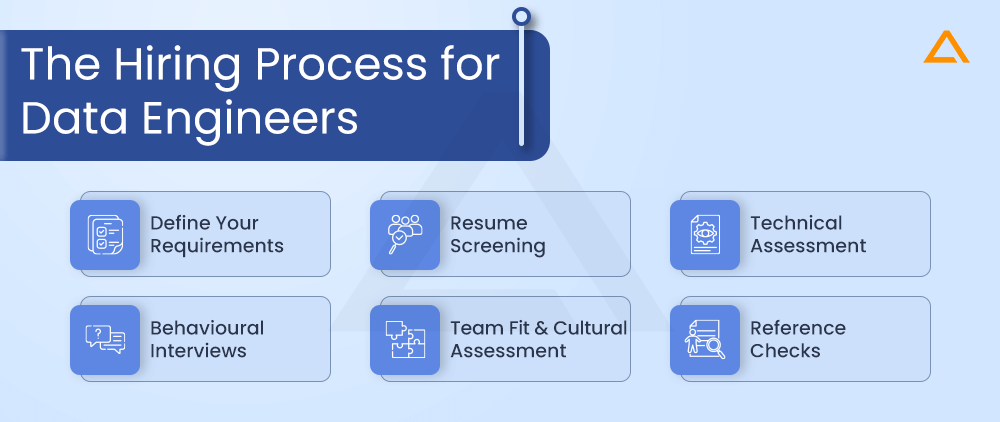
Define Your Requirements
Start by clearly defining the role. What specific skills are essential? What projects will the data engineer be working on? Creating a detailed job description will help you attract the right candidates.
Resume Screening
Once you’ve posted the job, you’ll likely receive a large number of applications. Focus on candidates who have relevant experience, particularly those who have worked on similar projects or in similar industries.
Technical Assessment
Use coding tests, technical interviews, or take-home projects to assess the candidate’s technical skills. Platforms like HackerRank or LeetCode can be useful for creating custom coding challenges. The assessment should focus on real-world problems that the candidate is likely to encounter on the job.
Behavioural Interviews
In addition to technical skills, it’s important to assess the candidate’s soft skills. Behavioural interviews can help you understand how the candidate approaches problem-solving, teamwork, and communication.
Team Fit and Cultural Assessment
Consider whether the candidate’s working style aligns with your company culture. A candidate who is technically proficient but doesn’t fit into the company’s work environment may not be successful in the long run.
Reference Checks
Before making an offer, conduct reference checks to verify the candidate’s previous work experience and performance.

Hey!!
Looking for Data Engineering Service?
Revolutionize Your Data Infrastructure with Cutting-Edge Engineering Services from Aglowid IT Solutions!
Top Interview Questions for Data Engineers
Hiring a data engineer requires a deep understanding of both technical expertise and the ability to work collaboratively in a team environment. The interview process should be designed to assess the candidate’s proficiency in key areas such as data pipeline development, database management, and problem-solving. Below are some detailed interview questions categorized by the skills they assess, along with insights on what to look for in the responses.

Technical Proficiency
Question: “Can you walk us through how you would design a data pipeline for processing large-scale data in real-time?”
What to Look For: The candidate should demonstrate a clear understanding of data pipeline architecture, including the selection of appropriate tools and technologies (e.g., Apache Kafka, Apache Flink). They should also explain how they would handle challenges such as data latency, scalability, and fault tolerance. Look for candidates who can articulate their thought process and justify their design choices.
Question: “How do you ensure data integrity and consistency across distributed systems?”
What to Look For: The candidate should discuss strategies for maintaining data consistency, such as implementing ACID (Atomicity, Consistency, Isolation, Durability) properties, using distributed transactions, or leveraging eventual consistency models. Their answer should reflect an understanding of the trade-offs involved in different approaches.
Problem-Solving Skills
Question: “Describe a challenging data engineering problem you’ve faced. How did you approach and resolve it?”
What to Look For: The candidate should provide a concrete example of a difficult problem they encountered, detailing the steps they took to diagnose the issue, explore potential solutions, and implement the best approach. Pay attention to their problem-solving process, creativity in finding solutions, and ability to learn from the experience.
Question: “How would you optimize a slow-running query on a large database?”
What to Look For: The candidate should discuss techniques such as indexing, query optimization, denormalization, and partitioning. They should also demonstrate an understanding of database performance tuning and be able to explain the impact of their optimizations on the overall system.
Database Knowledge
Question: “What are the key differences between SQL and NoSQL databases, and when would you choose one over the other?”
What to Look For: The candidate should be able to articulate the fundamental differences between SQL and NoSQL databases, such as the relational vs. non-relational models, and explain scenarios where one would be preferred over the other. Look for an understanding of use cases, such as choosing SQL for transactional data and NoSQL for handling unstructured or semi-structured data at scale.
Question: “Can you describe your experience with data warehousing solutions like Amazon Redshift or Snowflake?”
What to Look For: The candidate should provide insights into their hands-on experience with data warehousing tools, discussing how they have used these platforms to manage and analyze large datasets. They should also mention any specific challenges they faced, such as optimizing query performance or managing data migration, and how they addressed them.
Experience with Cloud Platforms
Question: “How have you used cloud platforms like AWS or Google Cloud in your previous projects?”
What to Look For: The candidate should demonstrate familiarity with cloud-based data engineering tools and services, such as AWS S3 for data storage, Google BigQuery for analytics, or Azure Data Factory for ETL processes. Look for examples of how they have leveraged cloud services to build scalable, cost-effective data solutions.
Question: “How do you approach data security and compliance when working in a cloud environment?”
What to Look For: The candidate should discuss strategies for ensuring data security, such as encryption, access controls, and compliance with regulations like GDPR or HIPAA. Their answer should reflect a comprehensive understanding of the security challenges in cloud environments and the steps needed to mitigate risks.
Collaboration and Communication
Question: “How do you typically collaborate with data scientists and analysts to ensure data quality and accessibility?”
What to Look For: The candidate should describe their approach to working with cross-functional teams, emphasizing clear communication, regular collaboration, and the use of tools like data catalogs or documentation to ensure that data is both high-quality and accessible. Their answer should reveal their ability to work well in a team and contribute to a collaborative data culture.
Question: “Can you give an example of how you’ve communicated complex technical concepts to non-technical stakeholders?”
What to Look For: The candidate should provide an example of a time when they needed to explain a technical concept in a way that was understandable to a non-technical audience. Look for their ability to simplify complex ideas, use analogies, and ensure that stakeholders understood the implications of technical decisions on the business.
Common Mistakes to Avoid When Hiring a Data Engineer
Hiring mistakes can be costly, both in terms of time and resources. Here are some common pitfalls to avoid during the hiring process:
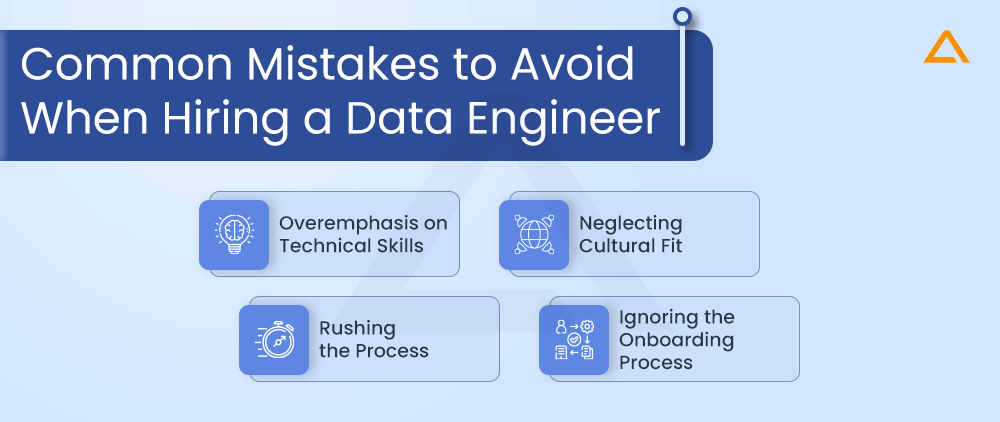
Overemphasis on Technical Skills
While technical expertise is crucial, it’s not the only factor to consider. A data engineer who lacks communication skills or struggles to work as part of a team may not be effective in a collaborative environment.
Neglecting Cultural Fit
A candidate might have all the technical skills you need, but if they don’t align with your company’s culture, it can lead to dissatisfaction and high turnover.
Rushing the Process
Hiring the right data engineer takes time. Rushing the process to fill the position quickly can result in hiring someone who isn’t a good fit.
Ignoring the Onboarding Process
Once you’ve hired a data engineer, the onboarding process is critical. Providing the right training, resources, and support will help the new hire integrate into your team and start contributing quickly.
How Much Does It Cost to Hire a Data Engineer?
Hiring a data engineer involves not only their salary but also other associated costs. Understanding these costs is crucial for budgeting and ensuring that you can offer competitive compensation that attracts top talent. Below is a detailed breakdown of the costs associated with hiring a data engineer.

Salary Expectations
The salary of a data engineer varies depending on factors such as experience, location, industry, and the complexity of the role. Here is a detailed look at the average salary ranges:
| Experience Level | Average Salary (USD) | Freelance Rate (USD/hour) |
| Entry-Level Data Engineer | $70,000 – $90,000 per year | $40 – $60 per hour |
| Mid-Level Data Engineer | $90,000 – $120,000 per year | $60 – $100 per hour |
| Senior Data Engineer | $120,000 – $160,000 per year | $100 – $150 per hour |
- Entry-Level Data Engineer: Typically, entry-level data engineers with 0-2 years of experience earn between $70,000 and $90,000 per year. They usually have a solid foundation in data engineering principles but may require guidance and training to work on complex projects.
- Mid-Level Data Engineer: With 3-5 years of experience, mid-level data engineers command salaries ranging from $90,000 to $120,000 per year. They can handle most data engineering tasks independently and have experience with a range of tools and platforms.
- Senior Data Engineer: Senior data engineers with more than 5 years of experience can earn anywhere from $120,000 to $160,000 or more per year. These professionals have a deep understanding of data engineering, often leading teams and designing large-scale, complex data systems.
Geographical Impact on Salary
The cost of hiring a data engineer can also vary significantly depending on the geographical location. For example:
- United States: Data engineers in tech hubs like San Francisco, New York, or Seattle can expect higher salaries, often exceeding $160,000 for senior roles due to the high cost of living and competitive job market.
- Europe: In cities like London or Berlin, salaries might range from €60,000 to €120,000, depending on the level of experience and demand.
- Asia: In countries like India or Singapore, salaries are generally lower, with entry-level positions starting around $30,000 to $50,000, but can still be competitive in global standards for senior roles.
Outsourcing to India
Outsourcing to India is a popular choice for many companies due to the country’s vast pool of highly skilled IT professionals and the cost advantages it offers. Here’s a look at what you can expect in terms of costs when outsourcing data engineering tasks to India.
- Average Hourly Rate: The hourly rate for a data engineer in India typically ranges from $15 to $40, depending on experience and expertise. This is significantly lower than rates in Western countries, where hourly rates can range from $60 to $150.
- Monthly Costs: For a full-time data engineer working approximately 160 hours per month, the monthly cost can range from $2,400 to $6,400. This is a cost-effective option compared to hiring in-house engineers in the United States or Europe, where monthly salaries can exceed $10,000.
- Project-Based Costs: If you opt for project-based outsourcing, costs will vary based on the project scope, complexity, and duration. For example, a mid-sized data engineering project might cost between $20,000 and $50,000 in India, while the same project could cost $50,000 to $100,000 or more if executed in Western countries.
Benefits of Outsourcing to IT Companies in India
Outsourcing to India has been a successful strategy for many global businesses. Here are some of the key benefits:
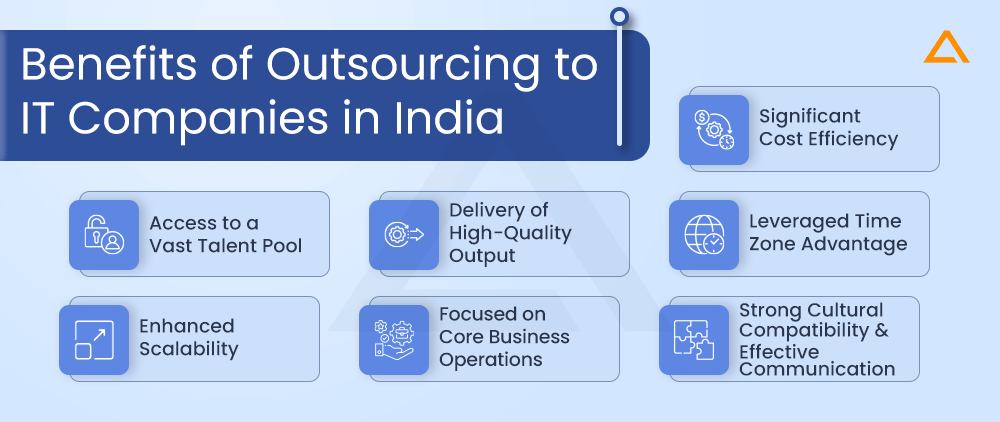
Cost Efficiency
The most significant advantage of outsourcing to India is cost savings. With lower labor costs, you can access top talent at a fraction of the price you would pay in the United States or Europe. This allows companies to allocate resources more efficiently, maximizing their return on investment.
Access to a Large Talent Pool
India is home to a vast number of skilled IT professionals. The country produces a large number of engineering graduates every year, many of whom specialize in data engineering, data science, and related fields. This large talent pool ensures that you can find the right expertise for your specific needs.
High-Quality Output
Indian IT professionals are known for their strong technical skills and problem-solving abilities. Many IT companies in India follow global best practices and adhere to international quality standards, ensuring that you receive high-quality output.
Time Zone Advantage
The time zone difference between India and Western countries can be leveraged for round-the-clock productivity. While your in-house team is offline, your outsourced team in India can continue working, speeding up project timelines and ensuring faster delivery.
Scalability
Outsourcing to India allows you to quickly scale your team up or down based on project requirements. Whether you need to ramp up resources for a large project or reduce the team size after completion, Indian IT companies offer the flexibility to adjust according to your needs.
Focus on Core Business
By outsourcing data engineering tasks to India, your in-house team can focus on core business activities and strategic initiatives. This division of labor ensures that your company remains agile and responsive to market changes.
Cultural Compatibility and Communication
Indian IT professionals are often well-versed in English, making communication smooth and effective. Moreover, Indian IT companies are accustomed to working with international clients, ensuring cultural compatibility and alignment with global business practices.
Additional Costs
Beyond the base salary or hourly rate, there are other costs to consider when hiring a data engineer:
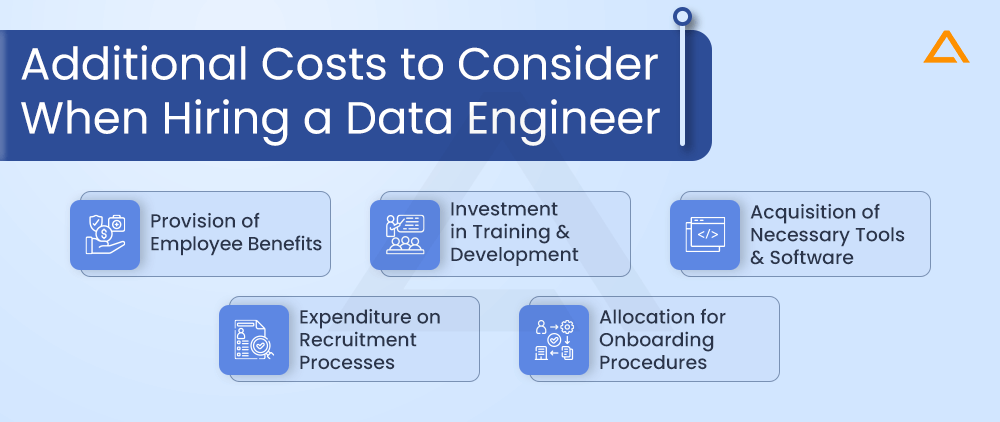
Employee Benefits
Full-time employees usually receive benefits such as health insurance, retirement plans, and paid time off. These benefits can add an additional 20-30% to the overall compensation package. For example, if you’re offering a salary of $100,000, benefits could increase the total cost to $120,000 – $130,000.
Training and Development
Data engineering is a rapidly evolving field, and continuous learning is essential. You may need to invest in training programs, certifications, or conferences to keep your data engineers up-to-date with the latest technologies and best practices. Annual training costs can range from $1,000 to $5,000 per employee, depending on the programs.
Tools and Software
Data engineers require specialized tools and software for data processing, storage, and analysis. The cost of these tools can vary widely depending on the scale of your operations and the specific technologies you choose to implement. For instance, cloud storage costs, database licensing fees, and data processing tools could add several thousand dollars annually to your budget.
Recruitment Costs
The process of finding the right candidate also involves recruitment costs, which can include job postings, recruiter fees, and the time spent by your team in interviewing and evaluating candidates. If you’re using a recruitment agency, fees typically range from 15-25% of the candidate’s first-year salary.
Onboarding
Effective onboarding is crucial for ensuring that your new hire becomes productive quickly. This might include orientation sessions, mentoring, and initial training, all of which can incur additional costs.
Conclusion
Hiring the right data engineer is essential for building and maintaining a strong data infrastructure. By understanding the role, identifying the key skills and qualifications, and following a structured hiring process, you can find a data engineer who will help your business leverage the power of data. Whether you’re just starting your search or are ready to make an offer, this guide provides the tools and insights you need to hire the best data engineer for your team.
By outsourcing to India, you can significantly reduce your costs while still accessing high-quality data engineering services. This approach offers a strategic advantage, allowing companies to optimize their operations and focus on growth.


